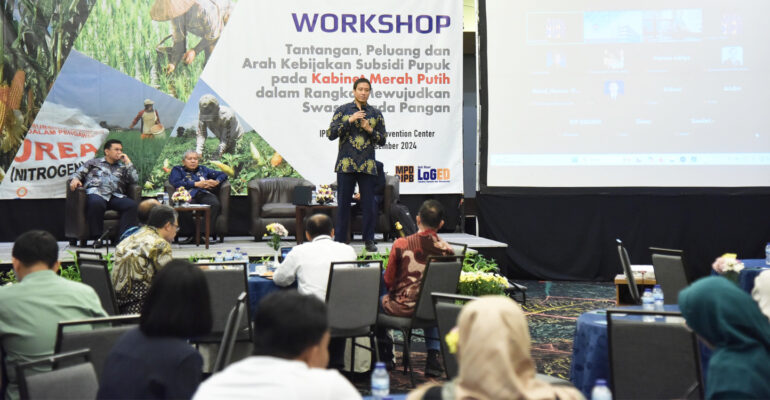FEM IPB University Holds Fertiliser Subsidy Program Resa review workshop

The Faculty of Economics and Management (FEM) of IPB University successfully held a workshop entitled “Challenges, Opportunities, and the Direction of Fertiliser Subsidy Policy in the Red and White Cabinet in Order to Realise Food Self-Sufficiency”.
At the opening speech, the Dean of FEM IPB University, Dr Irfan Syauqi Beik said, the problem related to subsidised fertilisers is very complex and not easily solved partially. Therefore, he emphasised the importance of synergy between stakeholders.
“I hope this activity will be a means to provide input and improve policies related to subsidised fertilisers and help socialise this subsidised fertiliser program,” he said during the opening of the workshop at IPB International Convention Centre, Bogor (2/12).
He added that at the farmer level, access to subsidised fertilisers is still considered not entirely easy. The input collected from this forum is expected to make it easier for farmers to obtain subsidised fertilisers.
Dr A Faroby Falatehan, Chairman of the Regional Development Management Study Program (MPD) of IPB University said, the fertiliser subsidy program that is being prepared by the government for 2025 has a concept that resembles the mechanism in 1997-1998. At that time, fertiliser distribution was carried out directly from the producer company to the joint farmer group (gapoktan) or retail kiosks.
“This program is feared that there will be another infiltration of subsidised fertilisers. Therefore, it is necessary to consider the mitigation so that the subsidised fertiliser is on target,” he said.
In that event, Member of the Ombudsman of the Republic of Indonesia, Yeka Hendra Fatika said that currently the regulations on the distribution of subsidised fertilisers are regulated in the Regulation of the Minister of Agriculture (Permentan) Number 1 of 2024 which applies from April 17, 2024. The regulation is a change to Regulation Number 10 of 2022 regarding the Procedure for Determining the Allocation and Highest Retail Price of Subsidised Fertilisers in the Agricultural Sector.
“The need for a higher legal umbrella at the level of presidential regulations to regulate the subsidy fertiliser policy to solve the existing problem as a whole,” he said. (US/RZ) (IAAS/TIA)



















